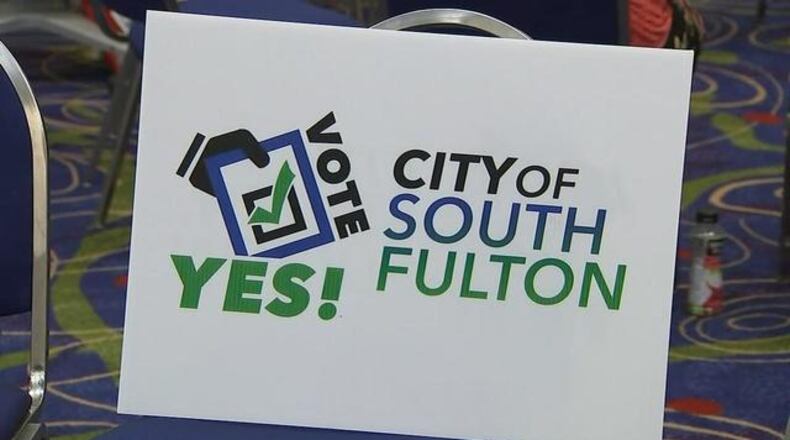As South Fulton voters prepared to cast their ballots for the city's first government, attorneys argued Monday about the new municipality's borders before the state supreme court.
By legislation, the boundaries for the City of South Fulton were set July 1. Five South Fulton neighborhoods are still in dispute, though, because Atlanta wants them in its borders.
Atlanta officials argue they started and finished their annexation process before South Fulton became a city. So far, that argument has been unsuccessful. A Fulton County judge said in the fall that Atlanta didn't finish the process in time.
Now, Atlanta officials are appealing to the state’s highest court.
Robbie Ashe, an attorney representing Atlanta, told the court Monday that the lower court had erred when it said the annexations weren't finished in time.
State law says annexations become effective on the first day of the month following the month they are approved. The Atlanta annexations were all approved in June. But by legislation, the boundaries for the City of South Fulton were set July 1.
Because the June annexations would have gone into effect July 1 — and state law says they needed to be done before the boundaries of South Fulton were set — they do not count, the lower court’s order said.
Ashe disagreed, saying the neighborhoods were no longer unincorporated July 1.
“Those neighborhoods switched from unincorporated at the same time the boundaries were set,” he said of the disputed areas.
He argued, too, that it was unconstitutional for the General Assembly to block some annexations, by virtue of the deadline, while annexations were still allowed elsewhere in the state.
Justices questioned the premise that the legislature couldn’t restrict annexations.
“What law restricts the General Assembly’s right to do whatever it wants?” Justice David Nahmias asked Ashe.
Though the legislature has the power to change the annexation law, Ashe said, it can’t do it by local act — affecting only one area of the state. When Sandy Springs incorporated and the requirement that no new city could be formed within three miles of an existing city was removed, he said, that had a statewide effect.
By setting the July 1 deadline for South Fulton’s borders to be formed, Ashe said, Fulton County had a “different annexation law” than everyone else.
“What you can’t do is change just a few jurisdictions,” he said.
If the supreme court overturns the lower court’s decision, it would be “incredibly disruptive” to residents who go to the polls on Tuesday to vote for leadership in their new city, and who are already identify themselves as part of South Fulton, said Josh Belinfante, who represented the areas that are trying to remain in the new city.
The five disputed areas are Danforth Road, The Cottages at Cascade, Cascade Manor, Cascade Falls and the Cascade Business Corridor. Belinfante also argued that the annexations in those areas were not valid because residents'petitions to join Atlanta did not meet all the requirements of the law.
Additionally, he said, Atlanta could not be sure that annexing those areas is in the best interest of residents. It is still unclear what schools students in annexed areas might go to, Atlanta’s or Fulton County’s.
Chief Justice P. Harris Hines thanked the attorneys for what he said was a “very important” case “well-argued on both sides.”
The case won’t be decided until after the election — and likely until after the April 18 runoff.
Other annexation issues also remain, including the issue of what happens to Fulton Industrial Boulevard, the last unincorporated piece of Fulton County. The General Assembly is currently considering legislation that would call for a referendum to dissolve the district, which cannot be annexed into any city. They are also looking at a change that would allow it to go into South Fulton or Atlanta — perhaps parts in both.
About the Author
Keep Reading
The Latest
Featured




